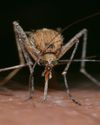
The natural reservoirs of the virus are fruit bats of the genus Pteropus (Thomas et al., 2019). NiV has 18,252 nucleotides long negative-sense ssRNA genome which is nonsegmented (Prescott et al 2012) packed in a helical nucleocapsid. The Henipavirus genus also includes pathogenic Hendra virus and nonpathogenic Cedar virus discovered in the years 1994 and 2009 respectively. Both Hendra virus and Nipah virus are enveloped and pleomorphic with an average diameter of about 500 nm (Ong and Wong, 2015). Six structural proteins are encoded by the NiV genome, namely, P (phosphoprotein), M (matrixprotein), F (fusion protein), G (receptor-binding glycoprotein), and L (RNA-dependent RNA polymerase). The interaction and attachment of the NiV G protein with the host cell ephrin B2 and/or B3 receptor activates the NiV F protein which lead to the internalisation of the virus through fusion of the viral envelope and host cell membrane (Ong and Wong, 2015).
Origin
NiV was discovered from an outbreak of respiratory and neurological disease in pigs and acute encephalitis with high mortality in workers handling those pigs in Malaysia during 1998-1999 (MacLachlan and Dubovi, 2010). The virus was first isolated by Chua et al. from the 1999 outbreak from the human cases with encephalitis from Sungai Nipah in Port Dickson, Malaysia and hence acquired the name "Nipah". The sample used for viral isolation was CSF of two patients and IgM antibodies against Hendra virus was found in the sample using IgM capture ELISA. The isolated virus caused syncytial formation after 5 days in Vero cell lines and was concluded as an undescribed virus related to Hendra virus of family Paramyxoviridae (Chua et al., 1999). Later the virus was isolated from the affected pigs also (MacLachlan and Dubovi, 2010).
Virus lineages
This story is from the March-April 2023 edition of Scientific India.
Start your 7-day Magzter GOLD free trial to access thousands of curated premium stories, and 9,000+ magazines and newspapers.
Already a subscriber ? Sign In
This story is from the March-April 2023 edition of Scientific India.
Start your 7-day Magzter GOLD free trial to access thousands of curated premium stories, and 9,000+ magazines and newspapers.
Already a subscriber? Sign In

Building world's 1st pyramid
In a preprint study published this summer, researchers proposed that ancient Egyptians built the world's first pyramid the 4,700-year-old Step Pyramid of Djoser, which sits on Egypt's Saqqara plateau using a \"modern hydraulic system\" powered by a long-gone branch of the Nile River.

Climate change arms the world, ovarian cancer pulls the trigger.It's time we disarm them both
Climate change, driven by human activities, leads to environmental changes such as rising temperatures, altered weather patterns, and increased pollution.

Climate Change Added 18 mph to Hurricane Wind Speeds over Past 5 Years
High ocean temperatures caused by global warming boosted maximum intensities for most storms between 2019 and 2023, as well as for every 2024 hurricane.

How Indian Vulture Decline Led to 500,000 Deaths in 5 Years
Once a common sight across India, vultures were abundant scavengers, often seen circling landfills in search of carcasses.

Understanding Monkeypox: Insights and Implications
Monkeypox, a viral zoonotic disease, has gained significant attention in recent years due to its re-emergence and sporadic outbreaks globally.

AI predicts that most of the world will see temperatures rise to 3°C much faster than previously expected
Three leading climate scientists have combined insights from 10 global climate models and, with the help of artificial intelligence (AI), conclude that regional warming thresholds are likely to be reached faster than previously estimated.

Infrared Radiation: A New Player In Mosquito Host-Seeking
The sound of mosquitoes is all around us when the sun sets and the air gets warm and sweltering.

Fish Oil May Benefit to Cure Alzheimer's, disorder: new findings
The benefits of fish and fish oil consumption are well-known in medical science as fish is considered a precious food resource that provides sufficient nutrition to humans.

A new class of antivirals could help prevent future pandemics
The arrival of Paxlovid in December 2021 marked another turning point in the COVID-19 pandemic an effective antiviral that has since successfully treated millions.

Turning carbon emissions into methane fuel
Chemists have developed a novel way to capture and convert carbon dioxide into methane, suggesting that future gas emissions could be converted into an alternative fuel using electricity from renewable sources. Carbon dioxide (CO2) is a greenhouse gas that accounts for a large part of Earth's warming climate, and is produced by power plants, factories and various forms of transportation.